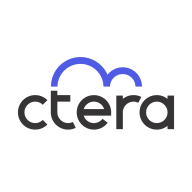

Acronis Cyber Protect and CTERA Enterprise File Services Platform both compete in the data protection and storage solutions category. Acronis appears to have the upper hand due to its comprehensive feature set, particularly in backup and recovery capabilities.
Features: Acronis Cyber Protect supports versatile data backup and recovery functionalities, works across different hardware and operating systems, and integrates cybersecurity features such as anti-ransomware. CTERA Enterprise File Services Platform is focused on secure file sharing and collaboration, backed by data protection through versioning and cloud replication. While Acronis is valued for its robust backup features, CTERA is noted for its strengths in cloud integration and file services.
Room for Improvement: Acronis Cyber Protect users report a complex installation process and significant resource demands. There are issues with backward compatibility across versions and calls for an improved Linux interface and support response times. CTERA users have raised concerns about the web portals and seek improvements in user experience features such as Drive Connect and the global management interface.
Ease of Deployment and Customer Service: Acronis Cyber Protect can be deployed on hybrid cloud, on-premises, and public cloud environments, but users experience inconsistent customer service, often struggling to find knowledgeable support. CTERA focuses on on-premises and hybrid cloud deployments and is generally seen as having responsive customer support, although complex issues might require time to resolve.
Pricing and ROI: Acronis Cyber Protect's pricing models are considered complex by some users, with concerns over license costs and recent price hikes, but it enjoys a positive ROI due to its reliability and features. CTERA Enterprise File Services Platform is seen as competitively priced, especially against products like Nasuni and Azure, offering substantial value and ROI in comparison to high-performance storage alternatives.
My customers see value in money and ROI with Acronis Cyber Protect, so they purchase it.
Adding SSD storage to Windows file servers is expensive, and we no longer need to back up those devices.
I am positive that CTERA has helped reduce the total cost of ownership by eliminating the need for manual storage management and reducing storage service processes.
Whenever I have a question, they respond very quickly each time.
I'll give them a nine for how responsive they are in technical support.
The support takes too much time to respond to callbacks.
They swiftly address concerns and take ownership of the call, providing a very satisfactory support experience.
The quality and speed of support for CTERA Enterprise File Services Platform is some of the best in the industry.
High-priority issues are handled promptly.
Acronis Cyber Protect is a scalable product.
I would rate it eight on a scale from 1 to 10 for scalability, considering it will be multiple assets.
If we need to upgrade CPU and memory, we should be able to do that without a license upgrade.
CTERA is a very scalable product, allowing us to grow.
It offers good scalability options, including vertical and outward scalability.
It ended up being at a point where we actually had to disable some features in order for the client to work through that specific purpose.
The stability of Acronis Cyber Protect is very high.
It has been pretty stable since then.
We had things deployed for years, and we were suddenly getting cloud sync issues that were crashing our sites.
It is very stable and reliable.
We are not very comfortable with cloud-based solutions at this time. We are looking for products which are entirely on-premises, so they remain within our control.
It's only after we discovered there was a compatibility issue with the application that the client was running that we actually had to do a lot of log file shipping to Acronis themselves and getting solutions because of other problems.
Having something such as a community for peer-to-peer interaction would be a valuable asset.
AI and automation features could enhance the platform, such as AI-powered search, predictive storage analytics, and intelligent alerts for proactive monitoring.
The main problem is that if two people are working on the same file, for example, one in the U.S. and one in Israel, they can overwrite each other’s work without any notification.
It would help to have a global single-pane-of-glass view of all my CTERA devices.
I would rate the price as nine out of ten.
Unlike other solutions that require hardware purchases, CTERA offers software licensing with flexibility across multiple infrastructure providers.
CTERA’s pricing should be more proportional and accessible so that cost is not the factor preventing customers from purchasing.
CTERA's pricing seems to be on par with some of the other players, such as Nasuni and Azure.
The biggest benefit of Acronis Cyber Protect for my customers is that it is a great asset to protect business data and ensure data is in a secure Vault.
The NASDAQ level CFS level backup is the feature I find most beneficial for our data protection strategy.
This is beneficial because any backup package stored in the cloud is not free, and if it shrinks well, it allows users to pay less for cloud storage.
As soon as something is written to the device, CTERA copies it to the cloud, where it's versioned with snapshots so we can recover it.
A vital advantage of this platform is its instantaneous recovery capability, allowing seamless access to a secondary gateway if the primary one fails.
It is a three-in-one solution for us. It is a file-sharing platform, an archiving solution, and also a backup solution.
| Product | Market Share (%) |
|---|---|
| Acronis Cyber Protect | 3.9% |
| CTERA Enterprise File Services Platform | 0.8% |
| Other | 95.3% |


| Company Size | Count |
|---|---|
| Small Business | 68 |
| Midsize Enterprise | 15 |
| Large Enterprise | 24 |
| Company Size | Count |
|---|---|
| Small Business | 2 |
| Midsize Enterprise | 2 |
| Large Enterprise | 8 |
The CTERA Enterprise File Services Platform provides a cloud-native global file system over public and private object storage, revolutionizing the world of hybrid cloud data solutions. Enhanced by a rich data services ecosystem, CTERA enables enterprises to gain full control of their data for optimal edge performance, data insight, and governance. The platform focuses on security, providing features like data encryption, access controls, and ransomware protection. Centralized management tools enable efficient data control and monitoring. The platform is being used to replace legacy NAS and file servers, especially at remote locations, and simplify backup and disaster recovery of file data while providing the flexibility of multi-cloud deployments with infinite scalability. CTERA is at the core of hybrid cloud transformations of some of the world’s largest banks, healthcare organizations, global media groups, and government agencies, in deployments that scale to tens of petabytes.
We monitor all Cloud Backup reviews to prevent fraudulent reviews and keep review quality high. We do not post reviews by company employees or direct competitors. We validate each review for authenticity via cross-reference with LinkedIn, and personal follow-up with the reviewer when necessary.